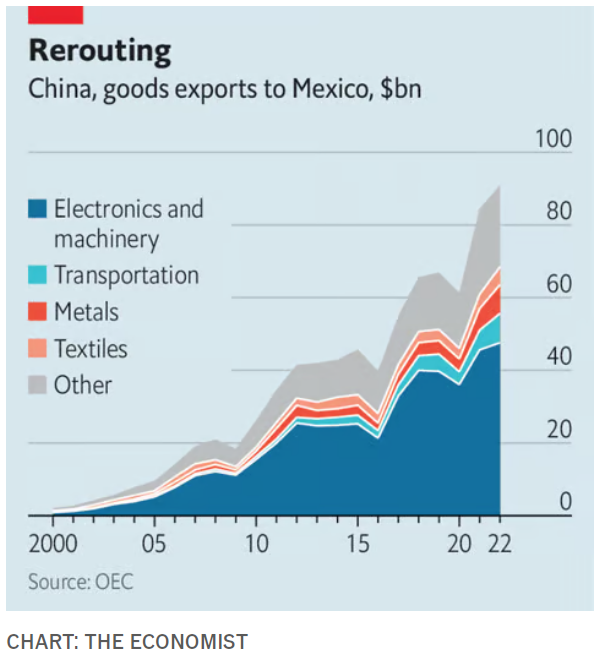
A free trade zone (such as NAFTA, now called USMCA) has free trade among its members and separate external tariffs. A customs union (such as the EU) has a common external tariff wall. Prior to the Trump administration, that distinction was not all that important, as NAFTA members had relatively low external tariffs. Now it’s become a major issue. Here’s The Economist:
Mexico’s official customs data show no sustained influx of goods from China. But some US officials and industrialists believe Chinese inflows are being undercounted, whether deliberately or not. The suspicion is that Mexico turns a blind eye to imports from China, and that those are then re-exported to the United States. . . . “What we’ve seen is that USMCA has really become a us, China and Mexico deal, where China is trans-shipping a lot of product through Mexico,” says Jeff Ferry of the Coalition for a Prosperous America, a group that represents manufacturers.
As the US has become more protectionist, the incentive to evade tariffs increases. It’s no surprise that imported parts are shipped to Mexico with little paperwork, just as it’s no surprise that illegal narcotics are sent to the US via Mexico. Bad regulations create black markets.
The US is one of the worst abusers of international trade rules. We routinely sign agreements and then ignore the provisions. During the Trump administration we forced a more punitive trade regime on Mexico, and I expect us to eventually abandon that agreement and force even more punitive rules on Mexico. When you are the biggest kid on the block, it’s easy to play the bully:
USMCA rules against unfair subsidies and market practices, which are common among Chinese companies. But in many cases no law or rule is being breached. Mexico offers Chinese automakers a path around the tariff wall because USMCA’s rules of origin contain what one us official calls “loopholes” that allow for the integration of Chinese components. An importer can assemble Chinese components in Mexico and label Mexico as the country of origin, obscuring Chinese involvement. “New tools may be needed,” says the official. . . . Robert Lighthizer, who was the lead trade negotiator during Donald Trump’s presidency, has said that a first step would be to strip China of its most-favoured-nation status. That would automatically ratchet up tariffs on Chinese products across the board. Enrique Dussel of UNAM, a university in Mexico City, says this would unmoor the world trade system. “The United States [would be] saying ‘adopt my rules or you’re against me’.”
Almost everywhere in the world, nationalism is on the rise. These periods generally don’t end well.


READER COMMENTS
tpeach
Mar 26 2024 at 1:02am
The problem with Free Trade Agreements is that they create even more paperwork and red tape to comply with rules of origin. With thousands of FTAs between countries, this has created a whole compliance industry. This was called the Spaghetti Bowl Effect by economist Jagdish Bhagwati.
A customs union on the other hand means sending goods from Hamburg to Prague is as easy as sending them to Frankfurt. The paperwork is only done before it enters the trade bloc. Hence why even with an FTA, post-Brexit trade between the UK and EU has been a nightmare.
Scott Sumner
Mar 26 2024 at 1:14am
Good point.
Matthias
Mar 27 2024 at 8:46pm
Unilateral free trade is even better. Does not need to require any paperwork.
Other countries can join by just declaring unilater free trade themselves.
Craig
Mar 26 2024 at 7:20am
Welcome to the Shunpike! Tariff version of thr Maginot Line?
Warren Platts
Apr 1 2024 at 2:40pm
Trump is right: we should revoke China PNTR. It’s not our job to take the other end of a raw deal from the worst beggar-thy-neighbor mercantilists, by far, on Planet Earth. And clearly, the U.S. should withdraw from UMSCA as well. Mexican collusion with the People’s Republic is only the half of it. And if the Mexican government can’t get control of the cartels, then the only conclusion to be drawn is that the cartels are the ones running Mexico. They are not our friends. We could MAYBE consider a customs union with Canada or even UK or Australia.
PS: as for tariffs, I see recent polling shows a solid majority of Americans support Trump’s proposal of a 10% across-the-board tariff on all imports. Probably because people are finally realizing tariffs actually work as advertised.
Comments are closed.